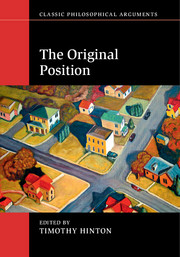Book contents
- Frontmatter
- Contents
- List of contributors
- Acknowledgments
- List of abbreviations
- Introduction: the original position and The Original Position – an overview
- 1 Justice as fairness, utilitarianism, and mixed conceptions
- 2 Rational choice and the original position: the (many) models of Rawls and Harsanyi
- 3 The strains of commitment
- 4 Our talents, our histories, ourselves: Nozick on the original position argument
- 5 Rawls and Dworkin on hypothetical reasoning
- 6 Feminist receptions of the original position
- 7 G. A. Cohen's critique of the original position
- 8 Liberals, radicals, and the original position
- 9 The original position and Scanlon's contractualism
- 10 The “Kantian roots” of the original position
- 11 Stability and the original position from Theory to Political Liberalism
- 12 The original position in The Law of Peoples
- References
- Index
Introduction: the original position and The Original Position – an overview
Published online by Cambridge University Press: 05 December 2015
- Frontmatter
- Contents
- List of contributors
- Acknowledgments
- List of abbreviations
- Introduction: the original position and The Original Position – an overview
- 1 Justice as fairness, utilitarianism, and mixed conceptions
- 2 Rational choice and the original position: the (many) models of Rawls and Harsanyi
- 3 The strains of commitment
- 4 Our talents, our histories, ourselves: Nozick on the original position argument
- 5 Rawls and Dworkin on hypothetical reasoning
- 6 Feminist receptions of the original position
- 7 G. A. Cohen's critique of the original position
- 8 Liberals, radicals, and the original position
- 9 The original position and Scanlon's contractualism
- 10 The “Kantian roots” of the original position
- 11 Stability and the original position from Theory to Political Liberalism
- 12 The original position in The Law of Peoples
- References
- Index
Summary
John Rawls's idea of the original position – arguably the centerpiece of his theory of justice – has proved to have enduring philosophical significance for at least three reasons.
First, it offered a fresh way of thinking about problems of justification and objectivity in political philosophy. At the heart of these difficulties is the need to find an objective point of view from which to deliberate about matters of basic justice. Here “objective” implies “not mired in partiality” and “not biased by one's particular position in the social world.” The original position is a hypothetical contractual situation in which parties who are ignorant about crucial features of themselves (such as how wealthy or talented they are, and what their vision of the best way to live is) are to select the principles of justice to regulate the basic institutions of their society. In selecting those principles, the parties are thought of as entering into an agreement that binds them to honor whichever principles they choose. By specifying that the parties are ignorant of matters that would allow them to favor themselves, Rawls vividly and unforgettably captures a widely shared sense that principles of justice cannot be justified by appealing to morally irrelevant considerations.
The original position is important in the second place because of the many interesting philosophical questions it raises. As soon as Rawls's argument had been fully digested, many philosophers felt that something was amiss with it. Questions abound. How could the fact that I would have agreed to certain principles in a special situation of choice give those principles binding authority over me? Is it true that Rawls's two principles in particular are the most rational choice that could be made in the original position? Are the assumptions needed to get the device off the ground really as weak and untroubling as Rawls seems to have thought?
Finally, the original position is significant because of its evident traction: it has inspired other philosophers to take up alternative positions, to rethink it, and to conceptualize afresh the philosophical problems to which the idea was initially addressed. The vast literature on Rawls's idea – and the use he himself made of it in his subsequent work – are testament to its capacity to inspire further philosophical reflection.
- Type
- Chapter
- Information
- The Original Position , pp. 1 - 17Publisher: Cambridge University PressPrint publication year: 2015

